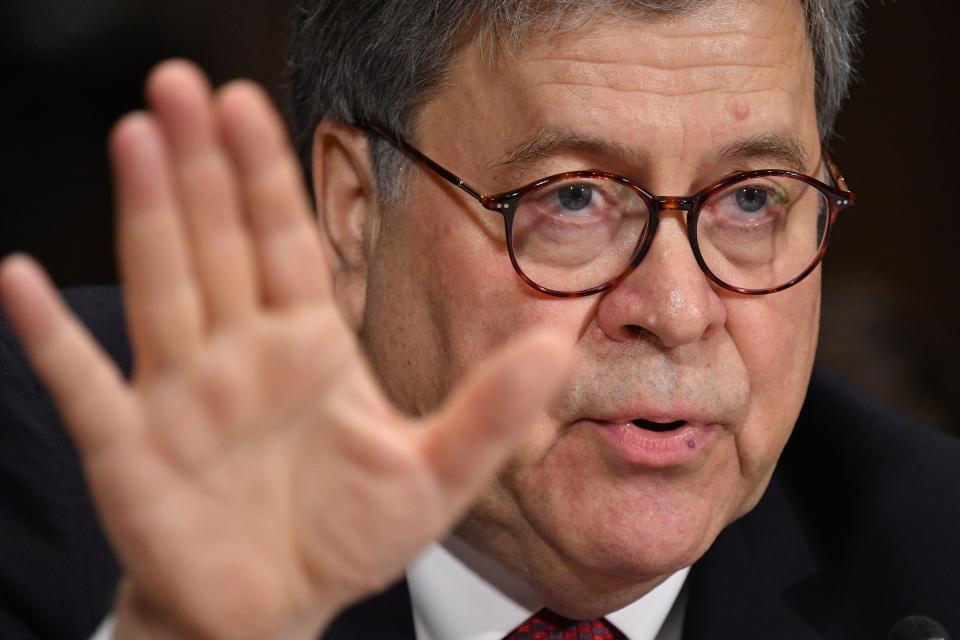Barr blames Mueller for not reaching conclusion on charging president
Attorney General William Barr criticized Robert Mueller on Wednesday for failing to exercise his “responsibility” as a prosecutor to decide whether President Trump violated the law by obstructing the Russia investigation.
“Was it the special counsel’s responsibility to make a charging decision?” Sen. Charles Grassley, R-Iowa, asked Barr at a contentious hearing before the Senate Judiciary Committee.
“I think the Deputy Attorney General [Rod Rosenstein] and I thought it was,” Barr replied. He then suggested Mueller had no authority to even investigate the president for obstruction — using the powers of the grand jury — if he wasn’t prepared to charge him.
“If he wasn’t going to go down the path of making a traditional prosecutive decision, he shouldn’t have investigated” acts of alleged obstruction, Barr said.
When Mueller, citing a Justice Department policy against prosecuting a sitting president, failed to make a decision about whether to bring charges, Barr did his own analysis and declined to bring an indictment against Trump.
Barr’s comments were surprising in light of his long relationship with Mueller, dating back to the days he was attorney general under President George H.W. Bush and Mueller served under him as the chief of the criminal division.
But Barr has come under intense fire over his handling of the special counsel report, with top Democrats calling for his resignation or impeachment, after reports surfaced of a letter by Mueller to Barr disagreeing with the attorney general’s public statements about the report. The letter said Barr’s four-page summary, which appeared to clear the president of all wrongdoing, “did not fully capture the context, nature and substance of this Office’s work and conclusions.” The letter was sent on March 27, just three days after Barr released his summary on Sunday, March 24.

The testimony pointed to growing tensions between the two old colleagues as they maneuver to defend their handling of the Russia probe. Barr has come under sharp criticism from Democrats for misleading, if not lying, to members of Congress in testimony last month about whether he knew of the special counsel’s objections to the summary. Asked if he was aware of concerns that Mueller and his staff had over the summary, Barr neglected to mention the letter from Mueller he had received two weeks earlier.
Questioned closely about the matter Wednesday, Barr pushed back, conspicuously turning it into an accusation against Mueller himself.
Barr told the panel that the day after receiving Mueller’s letter, he called him and asked him, “What’s the issue here?” He asked Mueller if he thought anything in his four-page summary was “inaccurate,” and Mueller told him it was not “but that the press reporting was inaccurate.”
“He was very clear to me he was not suggesting that we had misrepresented his report,” Barr testified. But Barr said Mueller wanted him to release more information quickly that would explain why he reached his conclusions about possible obstruction by the president.
Specifically, Mueller asked Barr to release the introduction to the report and executive summaries of the two volumes. But Barr said he “was not interested in putting out summaries” but instead wanted to release the whole report once it was stripped of grand jury material, classified intelligence information and other material he determined could not be made public.
And Barr insisted the subsequent delay was Mueller’s fault, not his.
When he first met with Mueller and his senior staff on March 5 to learn about the report he was planning to deliver, he asked him to identify grand jury material so it could be removed from the public version, as required by law. But when he received the report on March 22, “unfortunately it did not come in that form.” As a result, it “quickly became apparent it would take three or four weeks” for him and Rosenstein to review the report and delete grand jury information.
And, he said, “we were frankly surprised” when he found out Mueller had decided not to make a decision about charging the president with obstruction of justice.
“We did not understand exactly why the special counsel was not reaching a decision,” Barr said. “When we pressed him, he said his team was still formulating an explanation.”
Democrats on the committee zeroed in on an exchange between Barr and Rep. Charlie Crist, D-Fla., in a hearing on April 9. Crist had asked about reports “that members of the special counsel’s team are frustrated at some level with the limited information included in your March 24 letter, that it does not adequately or accurately necessarily portray the report’s findings.”
“Do you know what they’re referencing with that?” Crist asked him. “No, I don’t,” replied Barr, who had received Mueller’s now-public letter — confidential at the time — two weeks earlier.
Questioned about it Wednesday, Barr insisted he did not mislead Crist with his answer, saying he did not know what “members” of Mueller’s staff were being referenced. Moreover, his March 24 letter was not a summary of “the finding” of Mueller’s report, only the bottom line “principal conclusions” that the president did not commit a crime.
Democrats were incredulous at the attorney general’s explanation. “That is masterful hairsplitting,” said Democratic Sen. Sheldon Whitehouse of Rhode Island.
_____
Read more from Yahoo News:
Starr report veteran says Trump's crimes are 'thousandfold' worse
'It's already begun': Feedback loops will make climate change even worse, scientists say
Revealed: The U.S. military's 36 code-named operations in Africa
Concerns mount over Jared Kushner's role in GOP money machine
PHOTOS: Uprising in Venezuela as troops join opposition leaders on the streets




